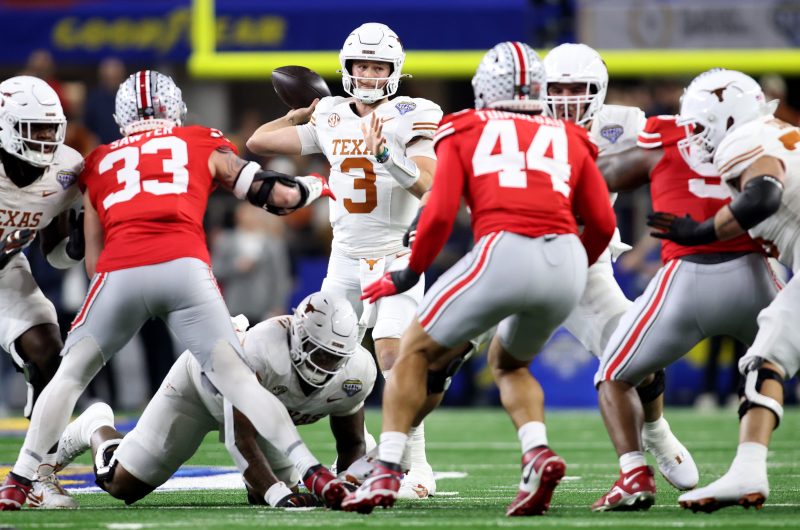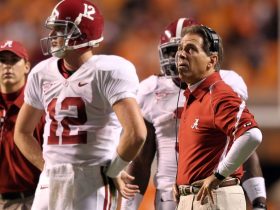The decision to stay or go can wait until Wednesday. This is now strictly about numbers for Quinn Ewers.
Large, record-setting, seven-figure numbers.
The day has arrived, everyone, where players can make more money by playing college football than leaving early for the NFL draft.
“Coming up short two years, it’s tough,” Ewers said after the Longhorns lost their College Football Playoff semifinal game at the Cotton Bowl to Ohio State and again ended his season one game short from playing for it all.
Only now there’s a third opportunity right around the corner — and it’s filled with a new team and lots of cash.
NFL STATS CENTRAL: The latest NFL scores, schedules, odds, stats and more.
College football players not in the national championship game have until Wednesday to declare for the NFL draft. That means Ewers and his representation have less than 48 hours to find the best deal for an All-American quarterback.
it won’t be that difficult.
Ewers’ time at Texas is done, the Longhorns almost certainly moving on to heralded backup Arch Manning in 2025. But that doesn’t mean Ewers’ options are limited because his draft stock has fallen since the beginning of the season.
Once considered a potential first-round selection, Ewers is now trending as a mid- to late-round selection. That’s where this story begins, and how that type of draft stock fall in previous years would’ve translated to a significant loss of value.
Not anymore. Not in this era of booming NIL deals, and pay for play beginning in the 2025 season.
The first quarterback selected outside the first round in the 2024 draft was Spencer Rattler, who went to the New Orleans Saints in the fifth round. That’s about where Ewers is currently slotted.
Rattler signed a four-year deal with the Saints for $4.35 million, with an average salary of $1.08 million. Ewers could quadruple that $1.08 number on the open college football market — for one season of work.
Former Georgia quarterback Carson Beck announced late last week he was staying in college — after previously announcing he was entering the NFL draft — and transferring to Miami. A source close to the situation, who spoke on the condition of anonymity because of the sensitivity of the negotiations, said Beck’s one-year deal with Miami is for $4 million with incentives.
If Ewers hits the college football open market, there will be multiple blue blood, deep-pocket teams bidding for him, including but not limited to Ohio State, Georgia and Southern California — all of which have the money to make Ewers an offer he can’t refuse.
And why would he?
Unless you’re a guaranteed first round pick, there’s no benefit in leaving early for the NFL. Especially if you’re an elite quarterback with CFP wins on your resume.
The old argument that a player is an injury away from the end of his career doesn’t wash anymore, either. He’s an injury away in the NFL, too.
More to the point: players can get disability insurance policies to protect their future earning ability. Some of those policies can pay as much as $5 million.
Colorado stars Travis Hunter and Shedeur Sanders last month played in a meaningless bowl game, in part, because they had, according to coach Deion Sanders, the “highest number of (insurance) coverage’ ever for a college football player.
Ewers can get the same thing, and a huge one-year deal. Frankly, it’s fiscally reckless for him to not return to college football in 2025.
Any way you look at it, Ewers will make more money playing college football in 2025 than playing in the NFL. He’ll also have the ability to choose where he plays, and select a championship-ready team.
He’s sitting on the bench in the NFL, a backup hoping to get a shot. He can do that any season, what’s the rush?
You want an NFL comparison? He’s Mac Jones, but Jones was selected in the first round of the 2021 draft by the New England Patriots, and is now a backup in Jacksonville.
Jones earned a huge payday with his rookie deal, one that even now can’t be matched in college. But Ewers won’t be a first-round selection, and won’t get that type of money.
Even if Ewers were a second-round pick — the next best scenario — he’d still make more money in college football. Will Levis was the second player picked in the second round in 2023 by Tennessee Titans, and signed a four-year deal worth $9.5 million — or an average salary of $2.38 million.
Ewers could nearly double that annual salary in one season of college football.
By taking that road, Ewers is playing the long game: making more money up front in college football, and working to improve for the 2026 NFL draft (and potentially increasing his rookie NFL contract). It’s the easiest decision since he left Ohio State after his freshman season, with the chance to play for his boyhood dream school Texas waiting in the wings.
This isn’t about love for school or loyalty. Texas has moved on, and so should Ewers.
He’s a college football mercenary now, and there’s nothing wrong with that. Find another home, bank some legitimate cash and improve your draft stock.
And maybe win a national title in the process.
Matt Hayes is the senior national college football writer for USA TODAY Sports Network. Follow him on X at @MattHayesCFB.







